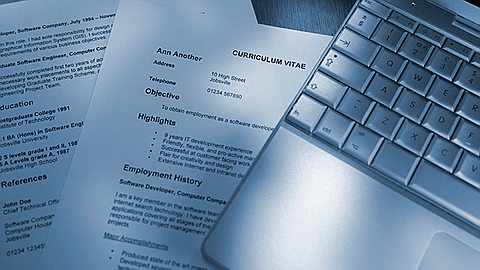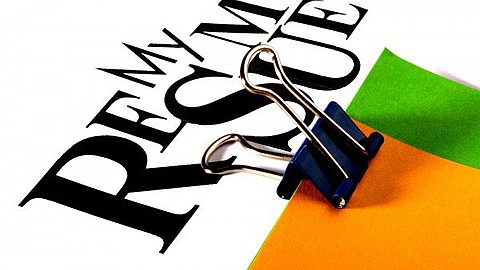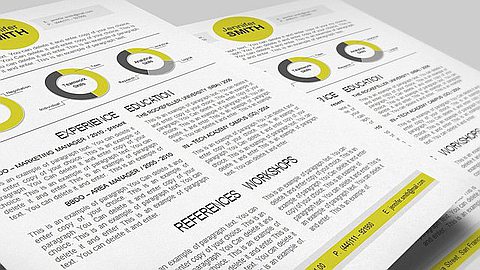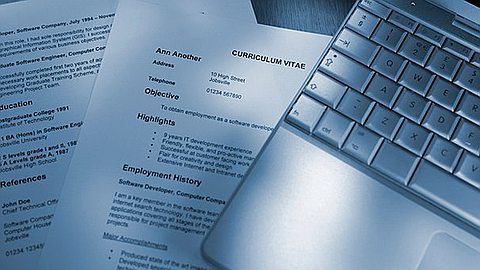43 Resume Tips That Will Help Get You Hired
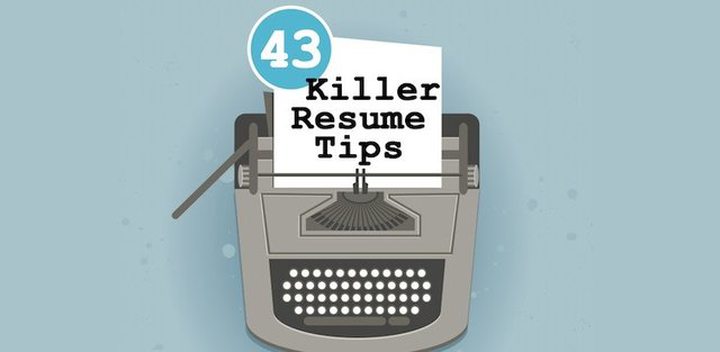
Well, search no more: We’ve compiled the best resume advice out there into one place. Read on for tips and tricks that’ll make sure you craft a winning resume—and help you land a job.
Telling Your Story
1. Think of your resume not as a comprehensive list of your career history, but as a marketing document selling you as the perfect person for the job. For each resume you send out, you’ll want to highlight only the accomplishments and skills that are most relevant to the job at hand (even if that means you don't include all of your experience).
2. Keep a resume master list on your computer where you keep any information you've ever included on a resume: old positions, bullet points tailored for different applications, special projects that only sometimes make sense to include. Then, when you're crafting each resume, it's just a matter of cutting and pasting relevant information.
3. Make sure your best experiences and accomplishments are visible on the top third of your resume. This top section is what the hiring manager is going to see first—and what will serve as a hook for someone to keep on reading.
4. Don't include an objective statement at the top of your resume. It's a little bit dated, it takes up valuable space, and—as long as you're tailoring the rest of your resume and cover letter to fit the position—it's unnecessary.
5. There are tons of different types of resumes, but the good old reverse chronological (where your most recent experience is listed first) is still your best bet. While you can use skills-based resumes in specific situations, some hiring managers will wonder what you're hiding.
6. Think long and hard before using a two-page resume. If you have enough relevant experience, training, and credentials pertaining to the position to showcase on more than one page of your resume, then go for it. But if you can tell the same story in less space? Do.
Formatting
7. Use a basic but modern font, like Helvetica, Arial, or Century Gothic. And make your resume easy on hiring managers’ eyes by using a font size between 10 and 12.
8. You can use a different font or typeface for your name, your resume headers, and the companies for which you’ve worked, but keep it simple and keep it consistent.
9. You don't need to include your address on your resume anymore (really!), but do include social media links, especially your LinkedIn profile and Twitter handle. (Implicit in this is that you keep said social media profiles suitable for prospective employers.)
10. Don't include photos or other distracting visuals. A recent study showed that "such visual elements reduced recruiters’ analytical capability and hampered decision-making" and kept them from "locating the most relevant information, like skills and experience."
11. Using creative resumes—like infographics, videos, or presentations—can be a great way to stand out from the crowd. But don't do this unless you're willing to put in the time, creativity, and design work to make it awesome. A great traditional resume will always be better than a mediocre "creative" one.
Work Experience
12. As a rule, you should only show the most recent 10-15 years of your career history and only include the experience relevant to the positions to which you are applying.
13. No matter how long you’ve been in a job, or how much you’ve accomplished there, you shouldn’t have more than 6-7 bullets in a given section. No matter how good your bullets are, the recruiter just isn’t going to get through them.
14. Remember that you should allocate real estate on your resume according to importance. So, if there’s a choice between including one more college internship or going into more detail about your current role, always choose the latter (unless a previous job was more relevant to the one for which you’re applying).
15. Look at each bullet point and make sure it’s understandable to the average person. Remember that the first person who sees your resume might be a recruiter, an assistant, or even a high-level executive—and you want to be sure that it is readable, relevant, and interesting to all of them.
16. Use as many facts, figures, and numbers as you can in your bullet points. How many people were impacted by your work? By what percentage did you exceed your goals? By quantifying your accomplishments, you really allow the hiring manager to picture the level of work or responsibility you needed to achieve this accomplishment.
17. Then, take each statement one step further and add in what the benefit was to your boss or your company. By doing this, you clearly communicate not only what you’re capable of, but also the direct benefit the employer will receive by hiring you.
18. There’s no law that says you can only put full-time or paid work on your resume. So, if you’ve participated in a major volunteer role, worked part-time, freelanced, or blogged? Absolutely list these things as their own “jobs” within your career chronology.
19. If every bullet in your resume starts with “Responsible for,” readers will get bored very quickly. Use our handy list of better verbs to mix it up!
20. People hire performers, so no matter what, you want to present yourself as a high performer. You can easily do this by using phrases like, “Invited to…” or “Recognized for…” or “Promoted to…” or “Known for… .”
21. Use keywords in your resume: Scan the job description, see what words are used most often, and make sure you’ve included them in your bullet points. Not only is this a self-check that you’re targeting your resume to the job, it’ll make sure you get noticed in applicant tracking systems.
22. Stuck on which words to include? Dump the job description into a tool like Wordle, which will analyze and spit out the most-used keywords.
23. What words shouldn't you include? Detail-oriented, experienced, and people person—these vague terms are chronically overused, and we bet there's a better way to describe how awesome you are.
Education
24. Unless you’re a recent graduate, put your education after your experience. Chances are, your last 1-2 jobs are more important and relevant to you getting the job than where you went to college is.
25. Usually, you should lay down your educational background by listing the most recent or advanced degree first, working in reverse chronological order. But if older coursework is more specific to the job, list that first to grab the reviewer’s attention.
26. Don’t list your graduation dates. The reviewer cares more about whether or not you have the degree than when you earned it.
27. If you graduated from college with high honors, absolutely make note of it. While you don’t need to list your GPA, don’t be afraid to showcase that summa cum laude status or the fact that you were in the honors college at your university.
28. If you feel your education section is a little light, load it with continuing education and professional coursework.
Skills, Awards, and Interests
29. Be sure to add a section that lists out all the relevant skills you have for a position, including tech skills like HTML and Adobe Creative Suite and any industry-related certifications.
30. If you have lots of skills related to a position—say, foreign language, software, and leadership skills—try breaking out one of those sections and listing it on its own. Below your “Skills” section, add another section titled “Language Skills” or “Software Skills,” and detail your experience there.
31. Feel free to include an “Interests” section on your resume, but only add those that are relevant to the job. Are you a guitar player with your eye on a music company? Definitely include it. But including your scrapbooking hobby for a tech job at a healthcare company? Don't even think about it.
32. Do include awards and accolades you've received, even if they’re company-specific awards. Just state what you earned them for, e.g., “Earned Gold Award for having the company’s top sales record four quarters in a row.”
Gaps and Other Sticky Resume Situations
33. If you stayed at a job for only a matter of months, consider eliminating it from your resume. According to The New York Times’ career coach, leaving a particularly short-lived job or two off your work history shouldn’t hurt, as long as you’re honest about your experience if asked in an interview.
34. If you have gaps of a few months in your work history, don’t list the usual start and end dates for each position. Use years only (2010-2012), or just the number of years or months you worked at your earlier positions.
35. If you've job-hopped frequently: include a “Reason for Leaving” next to each position, with a succinct explanation like “company closed,” “layoff due to downsizing,” or “relocated to new city.” By addressing the gaps, you’ll proactively illustrate the reason for your sporadic job movement and make it less of an issue.
36. Re-entering the workforce after a long hiatus? Top your resume with an “Executive Summary” section at the top, outlining your best skills and accomplishments. Then, get into your career chronology.
37. If you took time out of the workforce to raise kids, don't list your parenting experience on your resume, à la "adeptly managed the growing pile of laundry" (we've seen it). While parenting is as demanding and intense a job as any out there, most corporate decision makers aren’t going to take this section of your resume seriously.
Finishing Touches
38. Ditch the phrase "References available upon request." If a company wants to hire you, it will ask you for references—and it will assume that you have them. There’s no need to address the obvious (and doing so might even make you look a little presumptuous!).
39. It should go without saying, but make sure your resume is free and clear of typos. But don’t rely on spell check and grammar check alone—ask family or friends to take a look at it for you.
40. If emailing your resume, make sure to always send a PDF rather than a .doc. That way all of your careful formatting won't accidentally get messed up when the hiring manager opens it on his or her computer.
41. If you're applying through an applicant tracking system, stick to a .doc and standard resume formatting in a normal font like Arial, Courier, or Times New Roman—the ATS can’t read fancy fonts and will reject your resume out of confusion.
42. Ready to save your resume and send it off? Save it as “Jane Smith Resume” instead of “Resume.” It’s one less step the hiring manager has to take.
43. Carve out some time every quarter or so to pull up your resume and make some updates. Have you taken on new responsibilities? Learned new skills? Add them in. When your resume is updated on a regular basis, you’re not only ready to pounce when opportunity presents itself, you’ll also be confident that the document is in tip-top shape.
